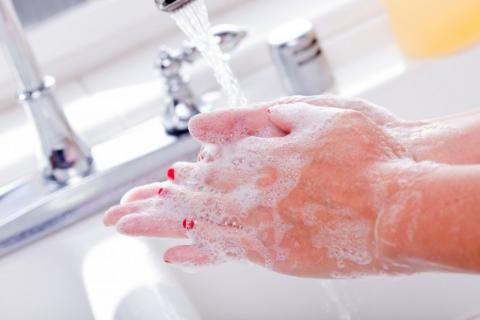Clean hands save lives: Global Hand Hygiene Day

Each year, millions of infections are prevented through the simple act of washing your hands. So today [Friday 5 May], on the World Health Organization’s global Hand Hygiene Day, the Public Health Agency (PHA) is reminding everyone that washing your hands regularly and thoroughly can save lives and avoid the need to use antibiotics to treat these infections.
The theme for Hand Hygiene Day is ‘Fight antibiotic resistance – it’s in your hands’.
Dr Lorraine Doherty, Assistant Director of Public Health (Health Protection) at the PHA, said: “Good hand hygiene is one of the most important tools in preventing illnesses. It can help protect us and our families by preventing the spread of infections – infections which may require treatment with antibiotics. However, overuse or misuse of antibiotics makes them less effective over time, and so the next time you pick up an infection, the antibiotic may not be as effective or even work at all.
“That risk can be reduced by simply washing your hands properly. It will decrease the possibility of spreading illness and means antibiotics are preserved for when they’re needed most.”
By following the steps below, everyone can ensure they have clean hands:
- wet hands with warm water;
- apply enough liquid soap to cover the surface of both hands;
- rub hands together, thoroughly applying the soap to all areas including the backs of the hands and between the fingers;
- rinse hands with warm water;
- dry both hands thoroughly.
It is important to remember that anti-bacterial gels and wipes are generally not a substitute for washing hands with liquid soap and warm water, as they may not be able to remove contamination (bugs and germs) in an effective way. However, gels and wipes may be useful as a short-term measure if hand-washing facilities are not readily available.
Dr Doherty continued: ‘’Clean hands are vital in controlling the spread of healthcare associated infections, including new and emerging multi-resistant infections. The PHA continues to work in partnership with all healthcare organisations to promote excellence in hand hygiene across all health and social care settings and prevent the spread of antimicrobial resistance.
“It is the collective responsibility of everyone – healthcare workers and the general public – to be proactive in preventing the spread of infection. I would urge everyone to follow good hand hygiene practices, whether in a healthcare setting, in the home or when participating in leisure or sporting activities.”
Ends
Notes to editors:
- The reduction of Healthcare Associated Infections (HCAI’s) and antimicrobial resistance (AMR) is a priority work area for the PHA and this year on 5 May, in conjunction with the Southern Health and Social Care Trust, the PHA will be hosting an event in Portadown Health Centre where Infection Prevention and Control practitioners will meet with members of the public to advise them on the importance of Hand Hygiene and Antimicrobial Resistance.
- Antibiotics are important medicines for treating bacterial infections. Bacteria can adapt and find ways to survive the impact of an antibiotic. This means antibiotics can and are losing their effectiveness. The more we use antibiotics, the greater the chance bacteria will become resistant and they can no longer be used to treat infections.
- Antimicrobial resistance (AMR) is the ability of a microorganism (like bacteria or viruses) to stop an antimicrobial (such as antibiotics, antivirals and antimalarials) from working against it.
- This year the World Health Organisation’s (WHO) ‘Clean Care is Safer Care’ programme demonstrates the unity between Antimicrobial Resistance (AMR) and Infection Prevention & Control (IPC) efforts, and the 2017 focus is on ‘'Fight antibiotic resistance - it's in your hands'. People are reminded that Hand Hygiene and general IPC are key weapons in the fight against antibiotic resistance.
